theartsdesk at the Ravenna Festival 2019 - in heaven with Dante's Purgatorio and Estonian rites | reviews, news & interviews
theartsdesk at the Ravenna Festival 2019 - in heaven with Dante's Purgatorio and Estonian rites
theartsdesk at the Ravenna Festival 2019 - in heaven with Dante's Purgatorio and Estonian rites
A dramatic tour from the tomb of Italy's greatest poet and music among the mosaics
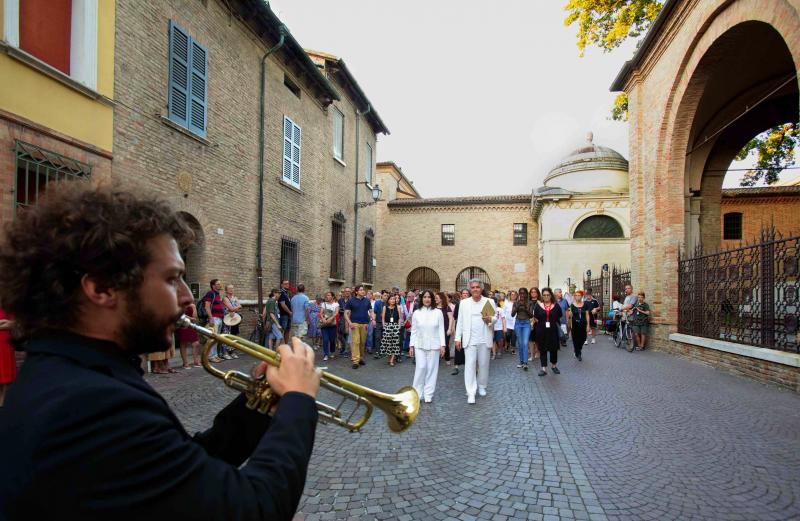
Two years ago Ermanna Montanari and Marco Martinelli, the visionary partners who have powered Ravenna's revolutionary Teatro delle Albe since 1986, led local people and international visitors down through the circles of Dante's Inferno. In 2021, the 700th anniversary of the greatest Italian poet's birth, they will take us into the presence of God.
Four Greta Thunbergs tending trees in pots, having ticked us off for making the planet what it is, seemed softened by Beatrice's words and finally touched us all, literally, with the blessing to each which is also the final line of Purgatorio: "Puro(a) e disposto(a) a salire a le stelle" - "Pure and made ready to ascend to the stars". Which we saw virtually throughout a spellbinding two hours, starting at Dante's tomb with Montanari and Martinelli as white-suited guides - both as Virgil (and later Beatrice), us as Dante. The first of other outstanding actors, Gianni Plazzi, played Cato at the gate of Purgatorio (pictured below with Montanari and Martinelli). 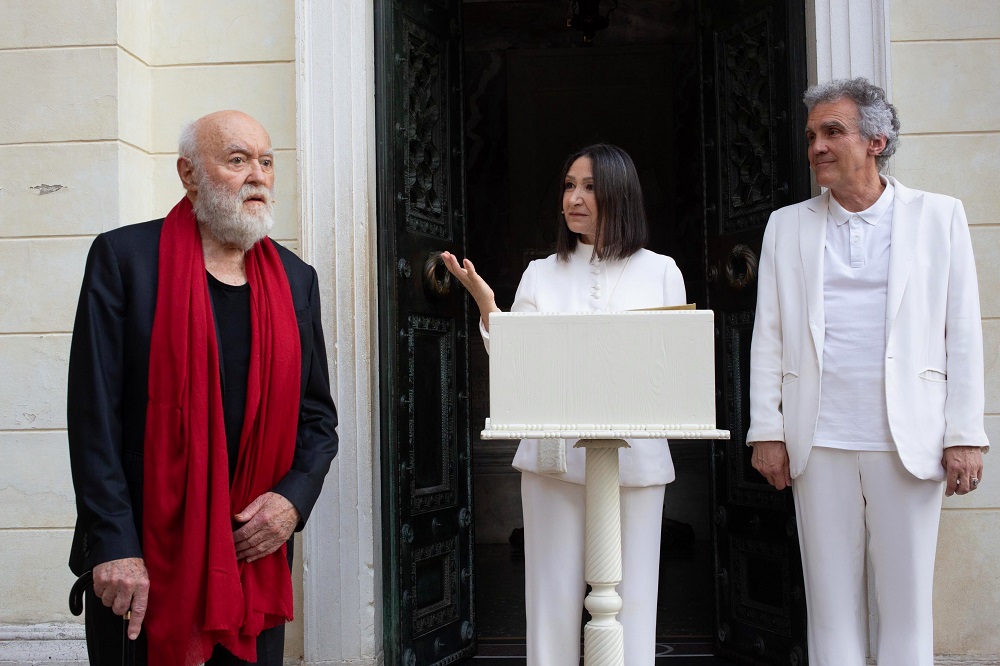 Then we were off through the streets, trumpet-led, with the choral music Dante described as coming from boats at a distance and on balconies above us in the Via Girotto Guaccimani. The use of music, live and pre-recorded, throughout was first-rate, performed by a variety of ensembles professional, student and amateur, and including.soundscapes by Teatro delle Albe's regular collaborator Luigi Ceccarelli. Gates near the Teatro Rasi were opened; we passed through to an outside staircase of women violently killed (Purgatorio Canto V) and a classroom where a Joseph Beuys and others dressed like him took up Dante's disquisition on contemporary creative artists and their successive measures of fame (Cimabue followed by Giotto, Guido Cavalcanti and after him Guido Guinizelli as described by Oderisi da Gubbio in Canto XII), Our inspirational duo believe in bringing the past into the present, and vice versa; if it seems didactic, then it's also poetic, just like Dante in some of his greatest lines and images.
Then we were off through the streets, trumpet-led, with the choral music Dante described as coming from boats at a distance and on balconies above us in the Via Girotto Guaccimani. The use of music, live and pre-recorded, throughout was first-rate, performed by a variety of ensembles professional, student and amateur, and including.soundscapes by Teatro delle Albe's regular collaborator Luigi Ceccarelli. Gates near the Teatro Rasi were opened; we passed through to an outside staircase of women violently killed (Purgatorio Canto V) and a classroom where a Joseph Beuys and others dressed like him took up Dante's disquisition on contemporary creative artists and their successive measures of fame (Cimabue followed by Giotto, Guido Cavalcanti and after him Guido Guinizelli as described by Oderisi da Gubbio in Canto XII), Our inspirational duo believe in bringing the past into the present, and vice versa; if it seems didactic, then it's also poetic, just like Dante in some of his greatest lines and images.
Narratives were necessarily selective: Manfred, Marco Lombardo (Alessandro Renda with a Chorus of the Wrathful by an upside-down map of Italy pictured below), Pope Adrian V and Ugo Capeto digging in a vegetable garden, before the torch-flanked procession to the Earthly Paradise, but all delivered with such awareness of the beauty in the Italian language by first rate actors. Eight hundred amateur citizens of Ravenna, from children to third-agers, have equal share in a cast and production team of over 1000, and that includes a prominent say for the immigrant population. The transformative Montanari-Martinelli theatre is well-known in America, not at all in the UK. That must be remedied in 2021, if not before; Chichester, twinned with Ravenna, would surely be the place to achieve it. Think about it, Daniel Evans. 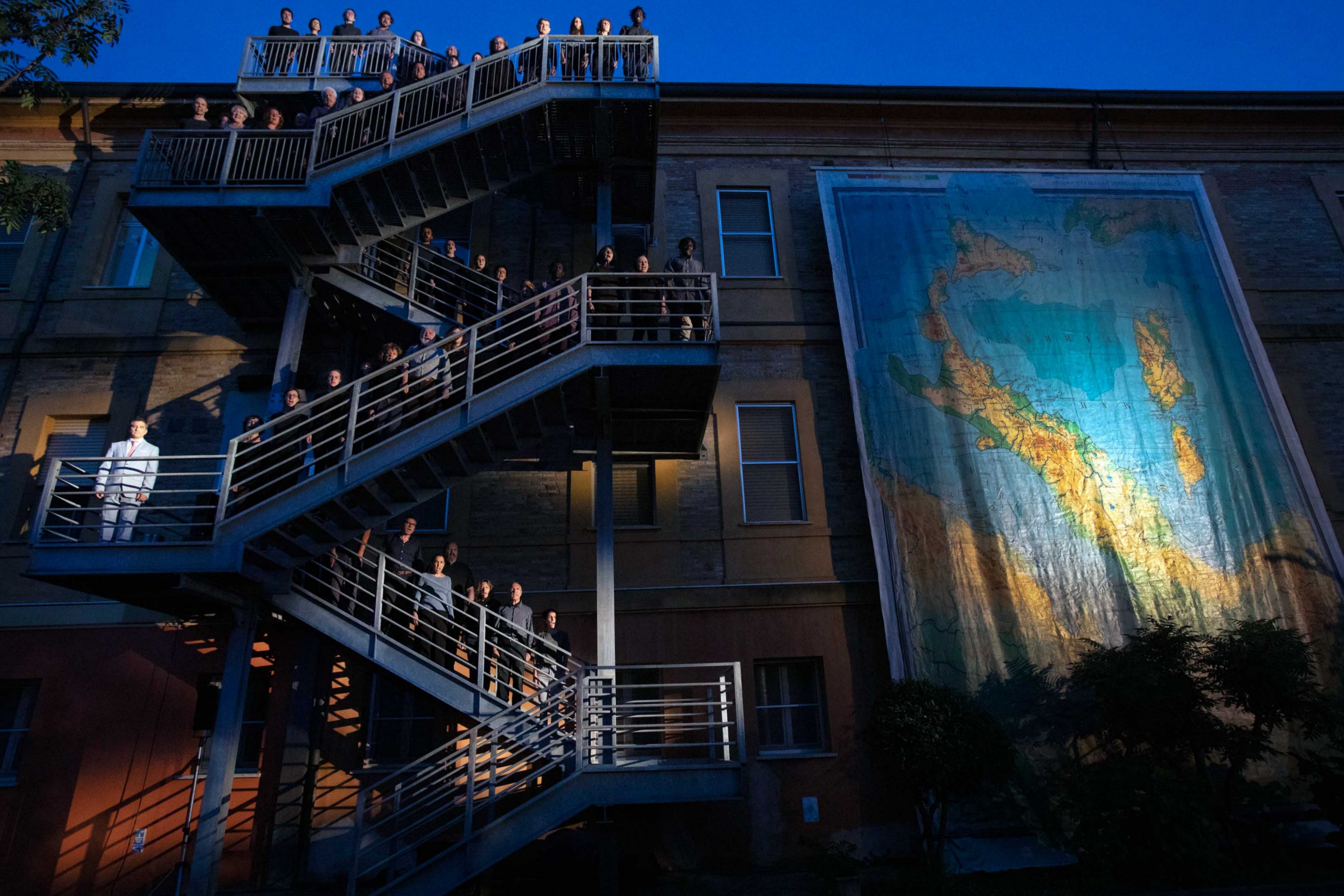 Purgatorio was my justification for returning to the Ravenna Festival, celebrating its 30th anniversary this year, but two of the other top events of my three-and-a-bit days there, if known quantities, were predictably superb. In the relative cool of the early evening, every day at 7pm, Vespers in the most vertiginous of the city's eight world-heritage mosaiced treasures, San Vitale, with its celebrated representations of Justinian and Theodora, give a platform to groups of all kinds. The local amateurs of Ludus Vocalis gave us an interesting selection of "tesserae", as they nicely put it, from 19th through to 21st century sacred music, the strings of the Faventia Ensemble made Caldara’s Missa dolorosa painful listening despite four good vocal soloists, but there was total magic in a perfectly-paced programme fusing Gregorian chant radiantly delivered, plus harmonic excursions, by the eight ladies of Armonioso Incanto with the bandoneon (accordion) of the masterly Daniele Di Bonaventura, in celebration of San Francesco’s life (pictured below by Luca Concas with conductor Franco Radicchia).
Purgatorio was my justification for returning to the Ravenna Festival, celebrating its 30th anniversary this year, but two of the other top events of my three-and-a-bit days there, if known quantities, were predictably superb. In the relative cool of the early evening, every day at 7pm, Vespers in the most vertiginous of the city's eight world-heritage mosaiced treasures, San Vitale, with its celebrated representations of Justinian and Theodora, give a platform to groups of all kinds. The local amateurs of Ludus Vocalis gave us an interesting selection of "tesserae", as they nicely put it, from 19th through to 21st century sacred music, the strings of the Faventia Ensemble made Caldara’s Missa dolorosa painful listening despite four good vocal soloists, but there was total magic in a perfectly-paced programme fusing Gregorian chant radiantly delivered, plus harmonic excursions, by the eight ladies of Armonioso Incanto with the bandoneon (accordion) of the masterly Daniele Di Bonaventura, in celebration of San Francesco’s life (pictured below by Luca Concas with conductor Franco Radicchia). 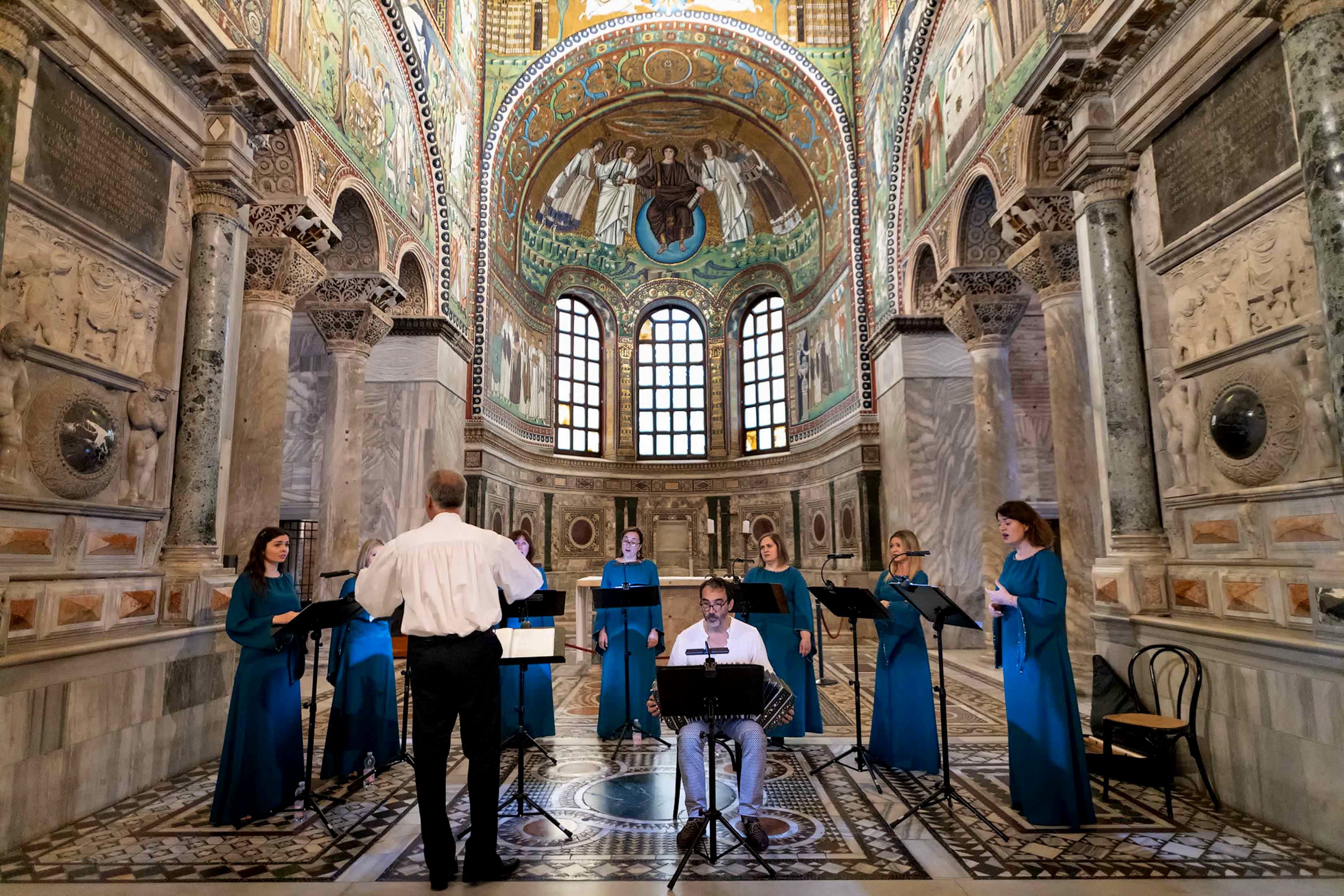 Another attempted fusion of a singular sort featuring the pianist, composer and conductor Vassilis Tsabropoulos and pioneering female specialist in Greco-Byzantine song Nektaria Karantzi in the beautiful cloister of the Biblioteca Classense didn't work so well. Here a less than well-trained voice adept at exquisite melismas clashed with self-indulgent Rachmaninov-meets-Clayderman interludes from Tsabropoulos. Greeks are the partners in the "Paths of Friendship" theme of the 2019 festival; after last year's testing collaboration with superlative Ukrainians, Riccardo Muti’s Luigi Cherubini Youth Orchestra have just travelled to Athens to join forces with three Greek orchestras and three choirs in Beethoven’s Ninth, repeating the concert in Ravenna (the vivacious Cristina Mazzavillani Muti is President of the Festival and a driving artistic force, though I didn’t see her this year).
Another attempted fusion of a singular sort featuring the pianist, composer and conductor Vassilis Tsabropoulos and pioneering female specialist in Greco-Byzantine song Nektaria Karantzi in the beautiful cloister of the Biblioteca Classense didn't work so well. Here a less than well-trained voice adept at exquisite melismas clashed with self-indulgent Rachmaninov-meets-Clayderman interludes from Tsabropoulos. Greeks are the partners in the "Paths of Friendship" theme of the 2019 festival; after last year's testing collaboration with superlative Ukrainians, Riccardo Muti’s Luigi Cherubini Youth Orchestra have just travelled to Athens to join forces with three Greek orchestras and three choirs in Beethoven’s Ninth, repeating the concert in Ravenna (the vivacious Cristina Mazzavillani Muti is President of the Festival and a driving artistic force, though I didn’t see her this year).
The theme, broadly speaking, is the sea, again invoking a line of Dante, …per l’alto mare aperto…. (on the high and open sea) but that only loosely connected with the visit of a world-class choir from Tallinn, the Estonian Philharmonic Chamber Choir whom I'd last seen in the superb acoustic context of that Hanseatic city's St. Nicholas Church back in April. Their participation in a Sunday morning mass at Dante's church, San Francesco, situated in the quiet Zona Dantesca, was unexpectedly greeted with "bravis" and loud, long-sustained applause at the end. 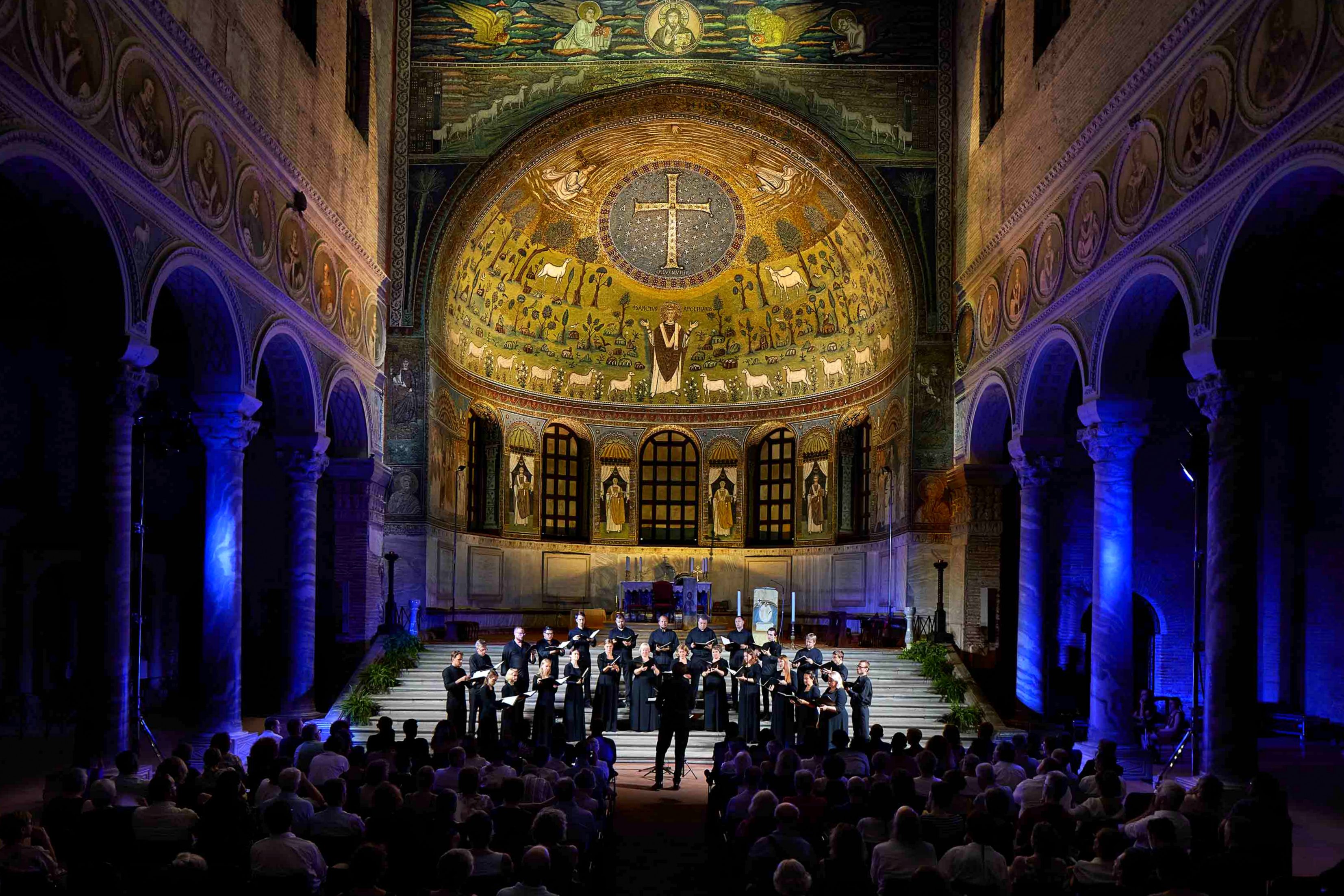 The congregation recites the Credo and sings the Agnus Dei, so there were only the Kyrie and Sanctus from Arvo Pärt's Berliner Messe, along with his mesmerising Nunc Dimittis at the end of the service, but glory, too, in three psalm settings by the 19th century Estonian composer Cyrillus Kreek (a revelation to me at the 2017 Estonian New Music Days in Tallinn). Pärt's austere, sombre but occasionally shattering Kanon pokojanen (the Orthodox Canon of Repentance) is not perhaps the ideal complement to the flora and fauna of the ravishing mosaic in the apse of Sant' Apollinare in Classe at sunset, but the singing under the choir’s Latvian music director Kaspars Putniņš was flawless throughout (pictured above by Zani-Casadio).
The congregation recites the Credo and sings the Agnus Dei, so there were only the Kyrie and Sanctus from Arvo Pärt's Berliner Messe, along with his mesmerising Nunc Dimittis at the end of the service, but glory, too, in three psalm settings by the 19th century Estonian composer Cyrillus Kreek (a revelation to me at the 2017 Estonian New Music Days in Tallinn). Pärt's austere, sombre but occasionally shattering Kanon pokojanen (the Orthodox Canon of Repentance) is not perhaps the ideal complement to the flora and fauna of the ravishing mosaic in the apse of Sant' Apollinare in Classe at sunset, but the singing under the choir’s Latvian music director Kaspars Putniņš was flawless throughout (pictured above by Zani-Casadio).
From the sacred to the profane, finally, and back to a real surprise on the road from Bologna to Ravenna. It seemed like a good idea to take advantage of a few hours in nearby Lugo to see its recently restored 18th century Pavaglione, formerly a covered square catering to the town’s speciality in the silkworm trade, now open in between its four colonnaded sides, but I had little idea what to expect from the event inside it. Which only proved how there can be excellence in any sphere – in this case a tribute to the popular balladeer Fabrizio De André, who died 20 years ago at the age of 58. Pop songs where the words are of primary socio-political importance – De André identified with the oppressed, among them prostitutes and the Roma people, spoke out against the Mafia and the Catholic Church, forgave the bandits who kidnapped him and his partner, the folksinger Dori Ghezzi, but not their rich sponsors – tend not to travel outside the country of the language in question, though De Andre had admirers such as David Byrne and Wim Wenders.
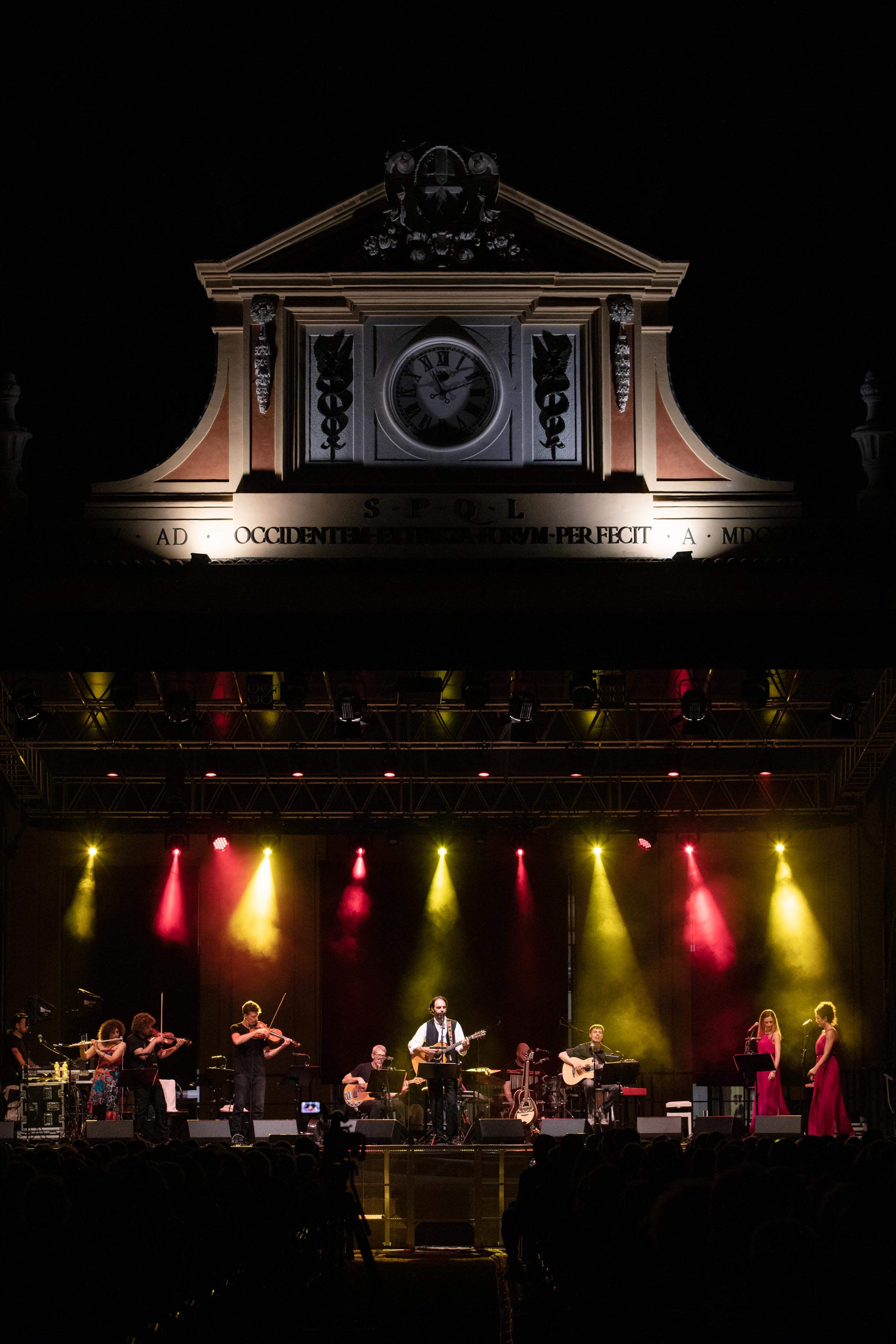 This tribute from the actor Neri Marcore was as lavishly served as some of De André’s concerts, with the superb strings and flute of the GnuQuartet and two consummate vocalists, Flavia Barbacetto and Angelica Dettori, among Marcore’s fellow performers. Inspirational enough, certainly, to seek out De André’s albums in a wonderful vinyl shop on Ravenna’s Via Girolamo Rossi. The owner was as engaging as all the other Ravennati I’ve had the pleasure of meeting – every Friday he hosts an evening with wine and a chosen artist’s tracks on superb sound equipment selected by an enthusiast or expert. Though he didn’t succeed in selling me a very pricey first edition of the album I wanted – a collection of De André’s songs in his native Genovese dialect, Crêuza de mä ("Path to the sea", another connection with the Festival theme) – a recent vinyl pressing of De André concerts from 1979 has kept up the connection since I returned from this most magical and serendipitous of towns, where one thing always leads to another equally felicitous.
This tribute from the actor Neri Marcore was as lavishly served as some of De André’s concerts, with the superb strings and flute of the GnuQuartet and two consummate vocalists, Flavia Barbacetto and Angelica Dettori, among Marcore’s fellow performers. Inspirational enough, certainly, to seek out De André’s albums in a wonderful vinyl shop on Ravenna’s Via Girolamo Rossi. The owner was as engaging as all the other Ravennati I’ve had the pleasure of meeting – every Friday he hosts an evening with wine and a chosen artist’s tracks on superb sound equipment selected by an enthusiast or expert. Though he didn’t succeed in selling me a very pricey first edition of the album I wanted – a collection of De André’s songs in his native Genovese dialect, Crêuza de mä ("Path to the sea", another connection with the Festival theme) – a recent vinyl pressing of De André concerts from 1979 has kept up the connection since I returned from this most magical and serendipitous of towns, where one thing always leads to another equally felicitous.
Explore topics
Share this article
The future of Arts Journalism
You can stop theartsdesk.com closing!
We urgently need financing to survive. Our fundraising drive has thus far raised £49,000 but we need to reach £100,000 or we will be forced to close. Please contribute here: https://gofund.me/c3f6033d
And if you can forward this information to anyone who might assist, we’d be grateful.

Subscribe to theartsdesk.com
Thank you for continuing to read our work on theartsdesk.com. For unlimited access to every article in its entirety, including our archive of more than 15,000 pieces, we're asking for £5 per month or £40 per year. We feel it's a very good deal, and hope you do too.
To take a subscription now simply click here.
And if you're looking for that extra gift for a friend or family member, why not treat them to a theartsdesk.com gift subscription?

Add comment